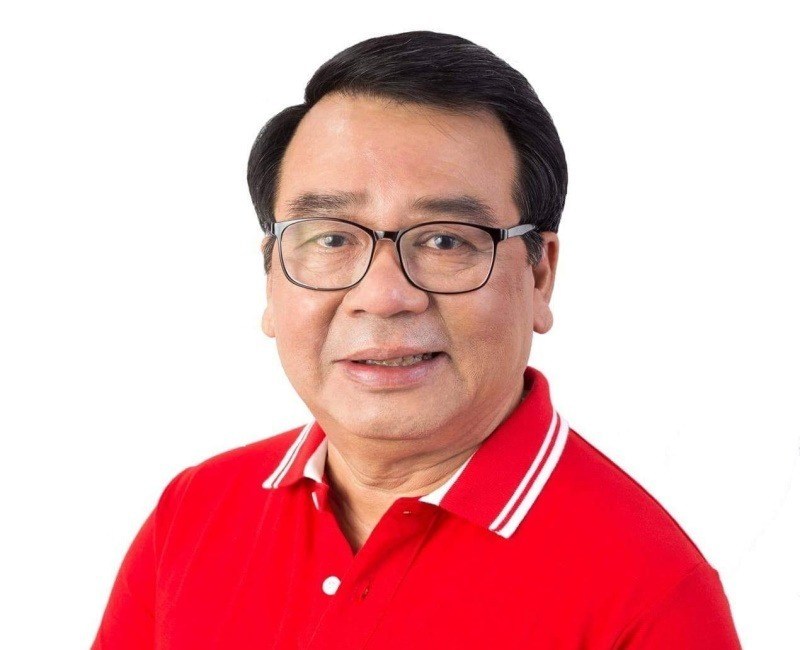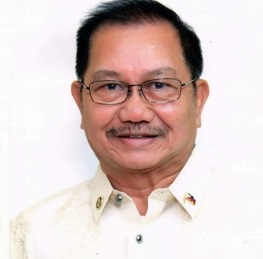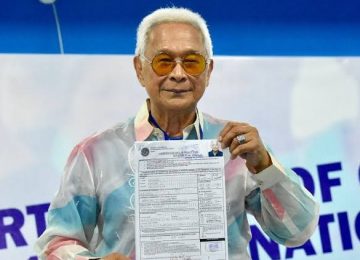Neri Colmenares is a veteran human rights lawyer and activist who was detained for four years when the Philippines was under Martial Law.
In 2018, he filed the second petition accusing President Duterte of murder and crimes against humanity before the International Criminal Court on behalf of eight victims of the “war on drugs“. He was also a co-petitioner in one of the 37 constitutional challenges to the Anti-Terrorism Act of 2020.
Neri Colmenares served as Bayan-Muna representative in the lower house from 2007 to 2016. In 2009, he helped form the Makabayan bloc (or Makabayang Koalisyon ng Mamamayan), composed of socio-civic party-lists including Bayan Muna, Gabriela, Anakpawis, ACT Teachers and Kabataan.
As Bayan-Muna representative, he championed senior citizens’ welfare, a genuine agrarian reform program for farmers, higher wages for laborers and protection of human rights. He played a role in impeachment cases against Presidents Benigno Aquino III, Gloria Macapagal Arroyo, former Chief Justice Renato Corona and Ombudsman Merceditas Gutierrez.
Colmenares launched two prior unsuccessful bids for senator in 2016 and 2019. For the 2022 polls, his senatorial bid is endorsed by the opposition 1Sambayan coalition. Colmenares is also part of the Senate slates of Sen. Manny Pacquiao and labor leader Leody de Guzman.
The Makabayan bloc, meanwhile, has endorsed the tandem of Vice President Leni Robredo and Sen. Francis Pangilinan, an alliance that Colmenares says is based on their unified position on the pandemic response as well as uplifting the lives of workers, farmers, the marginalized and indigenous people. The alliance is similarly founded on environmental issues, human rights, real peace, and sovereignty in the West Philippine Sea.
“We really need to deliver the message of a radical health program that should veer away from this incompetent COVID-19 response. People are dying. Another, of course, is the extrajudicial killings and human rights violations that are happening now.”
NERI JAVIER COLMENARES – PROFILE
Full Name: Neri Javier Colmenares
Nickname: Call Me
Birthdate: December 4, 1959 (Age 66)
Birthplace: Bacolod City, Negros Occidental
Parents: Rene Colmenares; Lolita Javier
Profession/Occupation: Lawyer
EDUCATION:
- Bachelor of Laws, University of the Philippines, 1996
- AB Economics, San Beda College,1990
WORK EXPERIENCE:
- Co-chairperson, Makabayan
- Senior Deputy Minority Leader, 16th Congress, 2013-2016
- Bayan Muna Party-List Representative, House of Representatives, 2007-2016
- Chairperson, Bayan Muna
- Legal Officer, National Amnesty Commission,1996-1999
- Associate, University of Melbourne
- Visiting Fellow, Australian National University
- President, National Union of People’s Lawyers
- Bureau Member, International Association of Democratic Lawyers
- Vice President, Confederation of Lawyers in Asia and the Pacific
- Professor, San Beda College of Law (1986-1994, 2006-2007)
MAJOR ACCOMPLISHMENTS:
Public Office
As Bayan Muna representative for three terms in the lower house, Neri Colmenares principally authored three laws. Another 20 bills he filed were substituted by subsequent House bills, three of which were enacted into law. He also served as senior deputy minority leader during the 16th Congress.
Colmenares played a key role in solidifying the progressive groups in the House of Representatives. In 2009, the Makabayan coalition emerged as a significant alliance of activists and civic groups representing marginalized sectors.
During both the Arroyo and Benigno Aquino administrations, Colmenares stayed on the opposition side. He was part of the prosecution teams in the impeachment cases against President Arroyo in 2009, against Ombudsman Gutierrez in 2011 and against Chief Justice Corona in 2012.
He also endorsed the first of two impeachment complaints against President Aquino for culpable violation of the Constitution, graft and corruption, and betrayal of public trust involving the Disbursement Acceleration Program, while Bayan Muna, GABRIELA, and Kabataan successfully challenged the constitutionality of the same stimulus program.
In 2016, Colmenares and the Makabayan bloc initially supported President Rodrigo Duterte’s administration, partly due to Duterte’s progressive campaign promises which included the resumption of peace talks with the National Democratic Front, the release of political prisoners, ending contractualization and increased support for farmers. They also partially supported the administration because Duterte’s landslide victory appeared to be a repudiation of what the coalition called the “elitist” Aquino administration.
Makabayan dropped its support in September 2017 after promised peace talks with the NDF fell through and Cabinet appointees supported by the coalition were denied confirmation; the brief alliance helped the passage of key legislation such as the Free Tuition Law, according to Makabayan. Condemning what it called the anti-people agenda of the Duterte administration, the Makabayan bloc joined the Liberal Party-led minority in the House of Representatives in 2018, which was previously part of the supermajority led by ousted Speaker Pantaleon Alvarez.
Since then, Colmenares, current and former Makabayan bloc members, along with other key opposition figures have often been baselessly and dangerously linked to communist rebels by a number of government officials, particularly the spokespersons of the National Task Force to End Local Communist Armed Conflict — a practice referred to and condemned as red-tagging.
Colmenares, other activists, journalists and political analysts decried the red-tagging efforts, including Solicitor General Jose Calida’s pinpointing of Colmenares and other progressive groups during the oral arguments on the constitutionality of the Anti-Terrorism Act and then-spokesperson Antonio Parlade’s admission that the NTF-ELCAC was surveilling Colmenares.
Private Sector
Before and after his tenure as Bayan Muna representative, Colmenares represented petitioners and argued before the SC in numerous cases involving constitutional challenges of executive orders and laws, such as the Visiting Forces Agreement, the custody of Daniel Smith in the Subic rape case in 2008, the Panganiban formula on the Party-List system, President Arroyo’s Executive Order 464 and Emergency Rule under Proclamation 1017 and the Public Assembly Act and the Calibrated Preemptive Response.
He has also filed petitions on behalf of private citizens challenging the validity of government contracts.
Recently, Colmenares appeared before the SC as one of the 13 lawyers handpicked to argue the constitutional challenges brought by the 37 groups of petitioners against the Anti-Terrorism Act of 2020.
Colmenares is also a legal writer, educator and lecturer on Mandatory Continuing Legal Education courses, through the National Union of People’s Lawyers.
PLATFORM AND POLICY:
Upholding justice, human rights, and democratic institution
- Provide relief to victims of human rights violations under the Duterte presidency
- Prosecute the anomalies during the pandemic
- End EJKs and other human rights violations
- Permit the investigation by the ICC and UN Human Rights Council
- Restore the GRP-NDFP peace talks to address the root of armed conflict
- Restore ABS-CBN franchise
Holistic COVID-19 response
- Treat the pandemic as a public health emergency, not a peace and order issue
- Free mass testing, vaccination, and contract tracing systems
- Aid for those affected by the pandemic – P10,000 for people who lost jobs, P15,000 subsidy for farmers and fisherfolks
- Support for community pantries and other forms of assistance
- Strengthen existing healthcare systems
- Provide proper salaries, protection, and benefits for healthcare workers
- Provide social aid for workers, farmers, fisherfolks
- Safe return of the transportation systems
Free public healthcare
- Free hospitalization, consultation, medicine and other necessary medical operations including kidney transplant and chemotherapy for the poor
Improve quality of living
In 2019, he promised to:
- Pass a law banning contractualization;
- Push for a national minimum wage
- Seek the repeal of value-added tax on oil products, electricity and water
Senior citizen welfare
- In 2016, he promised to work on convincing his colleagues in the House of Representatives to override Aquino’s veto on the proposed law seeking to increase the monthly pension of SSS pensioners by P2000
- In his 2019 senatorial bid, he denounced the SSS Rationalization Act which allowed the increase of contribution to 12% from 11%
Colmenares wants to prevent the Philippines from returning to the dark times of the Marcos dictatorship.
When Neri Colmenares learned that Ferdinand “Bongbong” Marcos Jr., the son of the late dictator, was running for president 50 years after his father first declared martial law, he felt pangs of pain in places inside his mind that had long been undisturbed. Like so many other survivors of the martial law period, which lasted from 1972 to 1986, Colmenares carries lifelong scars. When Marcos announced his bid for the presidency, much of the nation writhed in quiet agony and shock.
Marcos’s platform drumbeats his father’s era as “golden years” for the Philippines, to which he promises to return the country toward once more. He is adamant that no human rights violations were committed during his father’s tenure, that there was no plunder of state resources or abuse of power. The country was headed into unrivaled modernity, he says, until political rivals managed to get their way.
This is what Colmenares calls the most perilous political development in the post-martial law period.
A human rights lawyer who served as a Bayan Muna (People First) Party-list congressman for nine years, Colmenares is taking a shot for the Senate for a third time this May. His campaign centers on preventing the restoration of Marcosian power and upholding human rights for all Filipinos. He is the only candidate for a national position running now that was detained and tortured during the martial law period. While the significance of his latest bid is primarily political, he admits to an undeniable tinge of something personal as well. Colmenares does not want the family that tormented him to repeat their crimes.
The Mind Remembers
“Any president who believes the martial law period was golden is dangerous, because he may impose it again. Anyone who was part of the Marcos regime and helped in committing crimes should not be allowed to be elected president without being held to account for such participation,” Colmenares tells The Diplomat. “Bongbong was not a kid during martial law. He was 23 and aiding the regime when he was practically appointed by his father as governor of their home province.”
According to Amnesty International, during martial law, Marcos’ administration detained 70,000 individuals on charges of subversion, tortured 34,000 people, and committed 3,240 extra-judicial killings.
Colmenares was 18 years old when he was arrested for championing the return of student councils and publications. For five days military men beat him, bashing his head on the wall and electrocuting him; the details of his ordeal, he admits, have become fuzzy with time. What haunts him with striking detail to this day is the mental torture.
“Your body can become numb when you reach a certain threshold for pain. But the mind has no limits for accumulating harm. Any government that tortures an 18-year-old kid is an especially cruel one,” he says, shuddering.
On one occasion, his captors tied a man he didn’t know to a table in front of him. The soldiers stripped the man naked and proceeded to insert wires into his penis. They did so while taunting Colmenares: “You’re next.”
He also remembers enduring the infamous Russian roulette several times. A soldier placed a revolver with only one bullet in his mouth and pulled the trigger. “Each time I could already feel my brain splattered on the wall,” recalls Colmenares.
The ordeal shaped Colmenares’ legislative priorities when he made it into Congress in 2007. He authored the Anti-Torture Act, which first defined and penalized mental torture in Philippine law. He also authored the Human Rights Victims Reparation and Recognition Act which indemnified martial law victims with compensation taken from the 10 billion pesos of ill-gotten Marcos family wealth returned by Swiss banks in 1997. He hopes to do more of the same in the Senate, preferably without the dictator’s son in power to inhibit him.
Amnesiac Nation
The potential return of the Marcoses to power has been a long time coming. With the advent of social media and the easy misinformation that comes with it, Filipinos have been hit with years of historical revisionism. The claims peddled by Marcos and his supporters about the supposed wonders of his father’s time are largely backed up by a population deprived of genuine learning about national history. On social media, you can find all manner of incredulous assertions, even that the Marcos family built the Eiffel Tower in Paris and that it is a testament to their ingenuity.
For years, and even as recently as 2020, educators have flagged the absence of martial law abuses in textbooks. The Marcoses benefit from, and have been spurred by, a national amnesia surrounding that period. As a result, some are concerned they may use the cover of ignorance to pursue such policies again.
Enjoying this article? Click here to subscribe for full access. Just $5 a month.
President Rodrigo Duterte, whose daughter is running for vice president alongside Marcos, has been a long-time ally of the Marcoses. Colmenares believes that Duterte’s public admiration of the elder Marcos and the martial law period, alongside their mutual support, has served to boost the popularity of the dictator’s family. Marcos enjoys a lead in the pre-election surveys and the full support of the current administration.
“If Bongbong becomes president, what does that say about the EDSA uprising that overthrew his father? If things were so great before, why did the nation come together against them? The Marcoses are propagating false narratives, trying to make it look like we invented all the atrocities when in fact people were so afraid of the Marcoses before, it was inconceivable that anyone would fake a torture or killing,” says Colmenares.
Another common misconception about the martial law era is that the economy was in as good a shape it could be. Experts, however, have repeatedly disputed this assertion. According to the Ibon Foundation, a think tank, the elder Marcos incurred so much foreign debt, supposedly for welfare programs that never came to fruition, that Filipinos will be footing the bill until 2025, 39 years after he was deposed from power. They added that the martial law economy was so disastrous, almost half (49 percent) of the population was living in dire poverty at the time.
With the rampant misinformation about Philippine history nowadays, Colmenares feels like he’s living in a parallel dystopia where everyone is forced to misremember.
Colmenares says: “It pushed me to pursue a senatorial run and more so the advocacies to defeat him. What does a Marcos win say about their victims? That we lied about our experiences, that all the suffering never happened? If Marcos Jr. wins, the impact on the next generations of Filipinos is incalculable. Imagine, if someone like Hitler’s heir, who championed his ideas, sought to be the next Fuhrer.”
The Marcoses and Duterte do share many similarities. The current president’s enactment of the Anti-Terror Law to crack down on dissent and his imposition of Martial Law in the southern Philippines is arguably the closest the Philippines has gotten to open dictatorship again. Both Marcos and Duterte have records offering fascist futures that Colmenares refuses to back down from.
“We have been fighting back the tide of fascism for some time,” Colmenares says. “During the EDSA uprising, Bongbong was in full military fatigue, ready to shoot down protesters, he was part of the dictatorial government and accountable. He, his father and Duterte are of the same ilk. A nation with him as president will be one where poverty, repression, and injustice will thrive.”
BILLS AND RESOLUTIONS
Author
- RA 10639: The Free Mobile Disaster Alerts Act
- RA 10633: Special election precincts for persons with disabilities and senior citizens
- RA 10862: Nutrition and Dietetics Law
- RA 10353: Anti-Enforced Disappearance Law
- RA 10931: Universal Access to Quality Tertiary Education Act
- RA 10609: Protection of Students’ Rights to Enroll in Review Centers Act
- RA 11037: Masustansyang Pagkain Para sa Batang Pilipino Act
Co-author
- RA 9502: Universally Accessible Cheaper and Quality Medicines Act
- RA 10121: Philippine Disaster Risk Reduction and Management Act
- RA 9745: Anti-Torture Law
- RA 9513: Renewable Energy Act
- JR 00004: The Public School Teachers’ Additional Compensation Act
- RA 10069: Health Workers’ Day Act
- RA 10000: The Agri – Agra Reform Credit Act
- RA 10368: Human Rights Victims Reparation and Recognition Act
- RA10361: Domestic Workers Act
- RA 10380: Local absentee voting for members of the media
- RA 10389: Recognizance Act
- RA 10354: The Responsible Parenthood and Reproductive Health Act
- RA 10756: Election Service Reform Act
- RA 10911: Anti-Age Discrimination in Employment Act
- RA 10687: Unified Student Financial Assistance System for Tertiary Education Act
- RA 10801: Overseas Workers Welfare Administration Act
- RA 10767: Comprehensive Tuberculosis Elimination Plan Act










